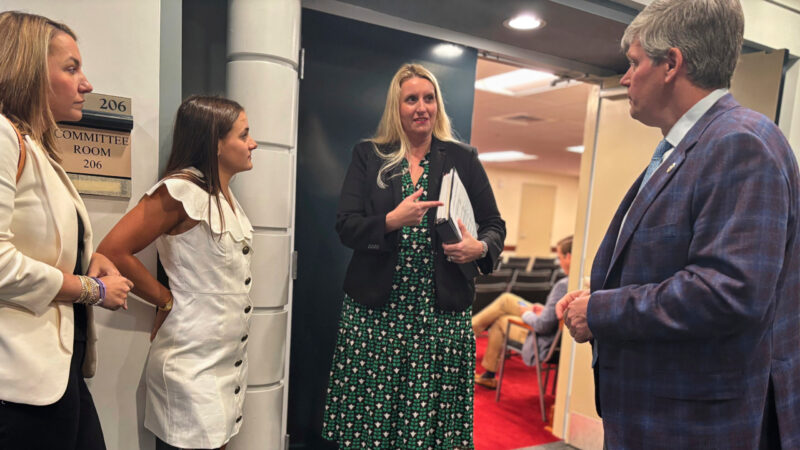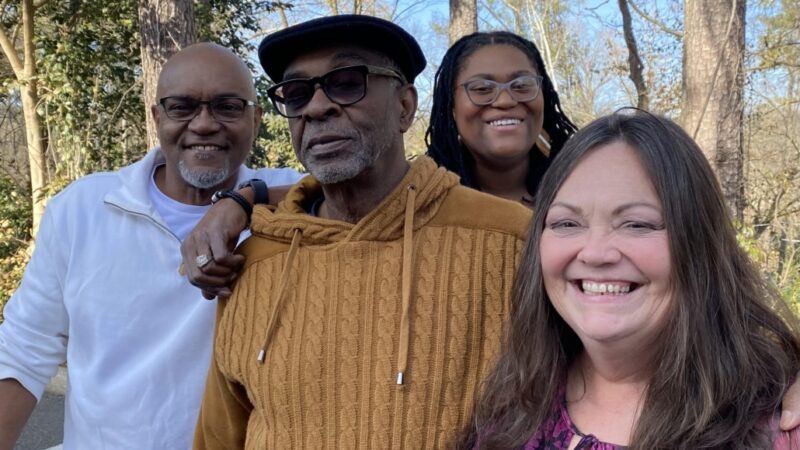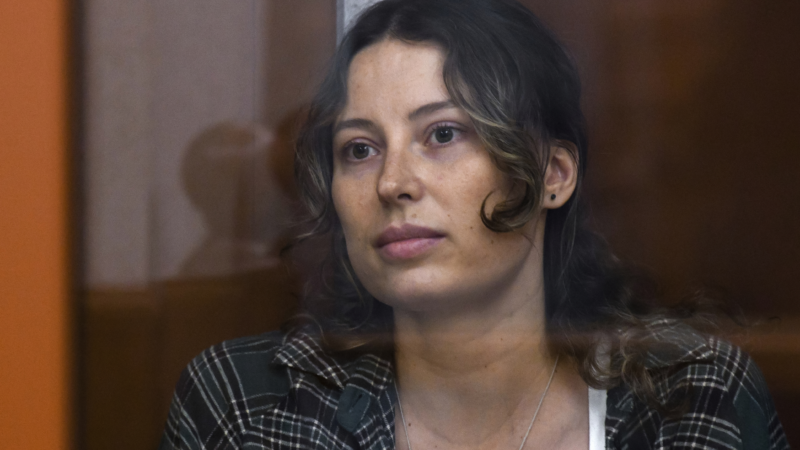This Virginia program helps former foster youth get degrees, at any age
When Alexandria Davis decided to pursue a two-year degree, she did everything she could think of to make the finances work. Davis, 26, did food prep at a cafe and she sold baked goods at farmers markets near her home in Richmond, Va. That was all on top of taking classes and getting assignments in on time.
“I was working crazy hours,” she said. “I was not sleeping a lot.”
But Davis is used to being self-sufficient. As a teenager, she spent time in foster care and said she never really had family she could lean on.
That’s a common experience for foster kids.
“We don’t have that safety net to fall back on. We don’t have room to mess up,” Davis said.
Which means big plans, like earning a degree, can easily get derailed. That almost happened to Davis when she got into a difficult situation with her then live-in partner and had to move.
“There was definitely an urgency to get out,” she said.
The only problem: She didn’t have enough money for a new place.
“Even with all that work, I was still scraping by,” she recalled, “and even in the negative some months.”

She decided to apply for emergency funding through her school, Brightpoint Community College. That’s when she learned about a program in Virginia specifically for students like her.
Great Expectations was designed to help people who grew up in foster care get their two-year degrees. The mostly privately-funded program started over 15 years ago and provides financial and emotional support to community college students of all ages, no matter how long they’ve been out of foster care.
The program is in every community college in Virginia; each college has a designated coach to work with students and to organize events so students in the program can get to know each other.
Great Expectations also provides a limited number of monthly stipends for housing, as well as emergency funding – and after Davis needed to move, the program awarded her both.
“It feels like they saved my life in a way,” Davis said.
Without that help, she said, “I think I would have dropped out of school because I would go back into that same cycle of realizing, ‘Hey, I can’t afford this.’ “
Instead, Davis is now working on her bachelor’s. After completing her associate’s, she transferred to Virginia Commonwealth University where she’s studying marketing. She also plans to pursue a master’s degree in business administration.

“A national model for other states”
People who grew up in foster care are often navigating so many challenges in adulthood, college can feel out of reach.
According to data from the U.S. Census Bureau, in 2021, 10.5% of Americans had an associate’s degree by age 25.
While there are no national numbers for former foster youth, state and regional studies have found they earn degrees at a lower rate.
An analysis of a 2011 study of three Midwestern states found only 3.7% of students who’d been in foster care completed an associate’s degree by age 29 or 30. And a 2020 California study found 6% of these students finished two-year degrees by age 23 or 24.
The two-year graduation rate for the approximately 5,000 students who’ve gone through Great Expectations is higher than both those studies: 9.5%. (Great Expectations doesn’t track the ages of their graduates.)
“Their students are graduating, they’re getting degrees, and they’re entering the workforce, and they’re doing really well,” said Allison Gilbreath, policy director of Voices for Virginia’s Children, a nonprofit that advocates for young people and families.
While over a dozen other states have statewide initiatives to help foster youth complete college degrees, not a lot of them look like Great Expectations.

The Fostering Academic Achievement Nationwide network is a coalition of such programs. Founder Maddy Day said Great Expectations serves “as a national model for other states who wish to ensure that their students with experience in foster care have holistic support to navigate the transition to and through a community college system and beyond.”
Great Expectations recently inspired Virginia lawmakers to fund more higher education support for these students. A new law ensures that current and former foster youth don’t have to pay tuition or room and board at Virginia’s public, four-year colleges. It took effect in July.
A rare program you can’t age out of
Almost a third of youth who transition out of foster care report being homeless between the ages of 19 and 21, and 1 in 5 report being incarcerated, according to the latest data from the Annie E. Casey Foundation’s KIDS COUNT Data Center.
Gilbreath, of Voices for Virginia’s Children, said that’s why housing stipends – like the kind Great Expectations provides to some students – are especially critical.
“Housing is the foundation,” Gilbreath said. “When you feel like you are in a safe housing situation that’s stable, you can start to think about the bigger picture. You can start to think about: ‘What do I want? What are my dreams? No one can dream when they don’t have anywhere to sleep.’ “
There are some federalprograms designed to support people who grew up in foster care as they enter adulthood – but you have to be younger than 25 or 26 or apply.
Those age limits aren’t uncommon for programs that support former foster youth. It’s why, as someone in her 30s, Keona Beamon worried she wouldn’t qualify for Great Expectations.
Beamon, 35, spent most of her teenage years in foster care. At age 18, she said she became homeless. Today, with help from Great Expectations, Beamon is just two semesters from finishing her business administration degree at Richmond’s Reynolds Community College.
She said she was relieved when she learned the program didn’t have any age limits – the emotional support and financial help (including gift cards and a monthly housing stipend) have both helped her stay in school.
“Four hundred dollars really goes a long way, and then to actually give it to you for a whole year … it just was a really big blessing for me,” Beamon said. “It’s still a blessing for me.”

(Clement Britt | Great Expectations)
Why it can be harder for current and former foster youth to get a degree
One of the biggest things Beamon said Great Expectations has taught her is how to accept help and support from other people, including the program’s coaches.
Nathanael Okpych, of the University of Connecticut, said that lesson is key. He studies educational outcomes for people in foster care, and said there are a lot of reasons this population struggles to complete degrees. Among them: Students who have experienced family separations can have a difficult time trusting the adults and supports that are designed to help them through college in the first place.
“Some of them take on this kind of very guarded, self-reliant stance, which serves them well in other areas, but when they’re in college, it’s new. It’s really difficult. It’s not something that you can just muscle through on your own,” Okpych explained. “You really need to rely on other people.”
Beamon said she was close with her first Great Expectations coach, Martha Harper, who checked in with Beamon regularly and listened to her concerns about college and other personal matters.
“She was just a blessing to me,” she explained. “Because without Great Expectations – or without Ms. Martha – I don’t think I would have been able to come this far in school at all. I probably would’ve dropped out because of the pressure, the stress and never having nobody to talk to while trying to go to school.”
Now, Beamon is developing a close relationship with a new coach, Karen Cole. Right before Thanksgiving, Beamon met with Cole on campus. Cole asked how she’s feeling about the next semester’s class load.
“I’m very confident, especially now that I’m almost done,” Beamon replied.
She told Cole she just got accepted to a nearby HBCU, Virginia State University, where she plans to complete her bachelor’s degree.
“I’m so happy, and so proud of you,” Cole said.
In their meetings, which happen whenever Beamon needs to talk, Cole provides Beamon with regular encouragement – something Beamon didn’t really experience growing up.
“People in the foster care system really need that push, that motivation,” Beamon said. “And even though we know that we are good people, sometimes we need to hear it: ‘You’re doing a good job,’ or ‘You’re doing better, congratulations.’ “
Beamon said she did hear it from her Great Expectations coaches – and it made all the difference.
Transcript:
ARI SHAPIRO, HOST:
People who grew up in foster care earn college degrees at rates far lower than the general population. A program in Virginia for former foster youth aims to change that. Its goal is to support college students of all ages with guidance and sometimes financial help while they work on their degrees. VPM’s Megan Pauly has this report.
KAREN COLE: Good morning, Keona.
KEONA BEAMON: Good morning, Miss Karen. Good morning.
COLE: Good to see you.
BEAMON: Good to see you too.
MEGAN PAULY, BYLINE: Thirty-five-year-old Keona Beamon is meeting with Karen Cole, her coach through the Great Expectations program.
COLE: So, yeah, going into next semester, you do have kind of a heavy – heavier load…
BEAMON: Yeah.
COLE: …Than you’ve had. How are you feeling about that?
BEAMON: I’m very confident, especially knowing that I’m almost done.
PAULY: Beamon is just two semesters from completing her associate’s degree in business administration at J. Sargeant Reynolds Community College in downtown Richmond. And she just got accepted to a nearby HBCU, Virginia State University, to pursue her bachelors.
COLE: I am so happy…
BEAMON: (Laughter).
COLE: …And proud of you.
BEAMON: Thank you.
PAULY: In their meetings, which happen whenever Beamon needs to talk, Cole provides her with regular encouragement. That’s not something Beamon really experienced growing up.
BEAMON: People in the foster care system really need that push, that motivation.
PAULY: Beamon spent a lot of time in foster care as a teenager. At age 18, she says she became homeless. Thinking back on those years, she says she never really felt like she had much support.
BEAMON: Basically, you just felt alone. Like, you really wanted your mother and your father to be the one who’d pick up all the pieces, and they’re just not there.
PAULY: Great Expectations is picking up some of those pieces. The mostly privately funded program started over 15 years ago. It provides financial and emotional support for students like Beamon, no matter how long they’ve been out of foster care. There are no national numbers, but state and regional studies have found former foster youth earn degrees at much lower rates than the general population. An analysis of a study of three Midwestern states found only about 4% completed an associates degree by age 29 or 30. But the graduation rate for students in the Great Expectations program is higher – more than double with that analysis found for two-year degrees.
ALLISON GILBREATH: Their students are graduating. They’re getting degrees, and they’re entering the workforce, and they’re doing really well.
PAULY: Allison Gilbreath is with the nonprofit Voices for Virginia’s Children. She advocates for policies that support foster youth. She says people who grow up in foster care can have a hard time settling into life as independent adults.
GILBREATH: They have experienced numerous traumas. They are trying to figure out life on their own, and that’s really hard.
PAULY: Almost a third of youth who transition out of foster care report being homeless between the ages of 19 and 21. One in five report being incarcerated. That’s according to research from The Annie E. Casey Foundation. Gilbreath says she thinks the Great Expectations program is important because it helps students meet their basic needs. The program offers housing stipends and helps cover emergency expenses, like for car repairs or to prevent evictions.
GILBREATH: Housing is the foundation. When you feel like you are in a safe housing situation that’s stable, you can start to think about the bigger picture. You can start to think about, what do I want? What are my dreams? No one can dream when they don’t have anywhere to sleep.
ALEXANDRIA DAVIS: It feels like they saved my life in a way.
PAULY: Twenty-six-year-old Alexandria Davis says, after she started community college, her relationship with her then live-in partner got difficult, and she needed to move. She applied for emergency funding through her school. And that’s how she learned about Great Expectations. The program helped with her unexpected housing expenses and awarded her a monthly stipend for other needs.
DAVIS: That first realization of, wow, someone is there to help me, I think really opened my eyes to being, like, wow, like, you know, people do care. People do care about me. People do care about my financial success, my educational success, my emotional success.
PAULY: Now, Davis is working on her bachelor’s. She’s studying marketing at Virginia Commonwealth University. She says, without the financial and emotional support she received from the Great Expectations program…
DAVIS: I think I would have dropped out of school because I would go back into that same cycle of realizing, hey, I can’t afford this.
PAULY: While there are lots of programs across the country designed to help former and current foster youth get a degree, not a lot of them look like Great Expectations. There’s a network of such programs called Fostering Academic Achievement Nationwide. A representative there said Great Expectations stands out for its, quote, “comprehensive approach to supporting students at two-year institutions.” It’s available at every community college in Virginia and helped inspire state lawmakers to fund more support at the state’s public four-year schools. That legislation took effect earlier this year and ensures that current and former foster youth don’t have to pay for tuition or room and board.
For NPR News, I’m Megan Pauly, in Richmond.
(SOUNDBITE OF NAS SONG, “I CAN”)
Shark attack survivor presses Alabama for an alert system to keep people safe in the water
Lulu Gribbin was one of three people bitten by a shark during a string of attacks off the Florida Panhandle. On Wednesday, she asked Alabama lawmakers to support a proposed shark attack alert system.
Reflections after 43 years in an Alabama prison
James Jones is one of thousands of men who served life without parole in an Alabama prison. He spent 43 years at the St. Clair Correctional Facility before being released at the age of 77.
U.S. stocks slide again as euphoria over Trump’s tariff pause starts to fade
U.S. stocks fell a day after posting spectacular gains over President Trump's decision to pause many of his tariffs. Now, some of that relief is starting to fade.
Aging former research chimps move to Chimp Haven
All of the former research chimpanzees that had been living on an Air Force base in New Mexico have finally arrived at a sanctuary in Louisiana. Many of these chimps are in their 50s and 60s.
U.S.-Russia ballerina freed in prisoner swap
Ksenia Karelina, jailed over a $50 donation to Ukraine, released after U.S.-Russia prisoner swap.
Healing soup recipes, Part 2: Definitely not your grandma’s chicken soup!
The second installment of our soup-a-thon. Vicky Hallett and Genevieve Villamora, correspondents. Marc Silver, digital editor. Radio interview ran last week. Digital publishing Thursday at 7 a.m.








